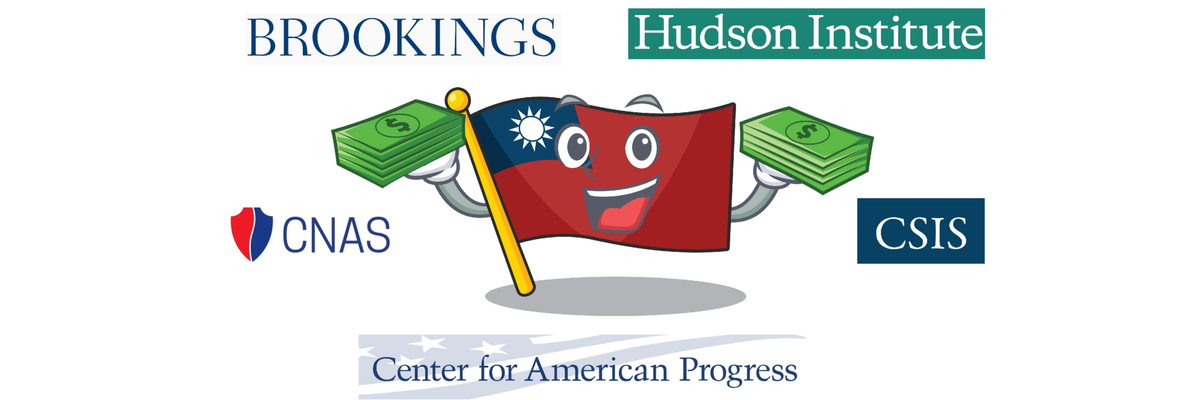This article was co-published with The American Prospect.
The conditions for a Cold War–style entanglement with China were set. COVID-19’s origins in Wuhan, the global economic downturn stemming from the novel coronavirus, and a presidential election in five months created a perfect storm.
The Trump administration, seeking to deflect blame for its slow response to the pandemic, fueled baseless theories about the origins of “the Chinese virus,” threatened a new trade war, and labeled the Democratic nominee “Beijing Biden,” accusing him of being too weak on China. Joe Biden, for his part, ran a controversial television commercial claiming that Trump “rolled over for the Chinese.”
Pushing back on bellicose statements from both parties requires credible policy advice from experts, many of whom are based at Washington research institutes. But five of the capital’s most prominent think tanks have been producing policy papers urging closer U.S. ties with Taiwan — a territory locked in an uncertain legal status that threatens to be a flashpoint between Beijing and Washington. These seemingly impartial research institutions are pushing for expanded arms sales and trade agreements with Taiwan without widely disclosing their high-level funding from the Taipei Economic and Cultural Representative Office (TECRO), Taiwan’s equivalent to an embassy.
The five think tanks — the Brookings Institution, the Center for American Progress*, the Center for a New American Security, the Center for Strategic and International Studies, and the Hudson Institute — all disclose their funding from TECRO but bury it deep on their websites or annual reports.
None of their researchers disclose the potential conflict of interest between Taiwanese funding and advocating for more security guarantees for and trade with Taiwan.
“Taiwan is an interesting case because we know Taiwan gives a good amount of money to think tanks, and we know they have a good amount of influence around town,” said Ben Freeman, director of the Foreign Influence Transparency Initiative at the Center for International Policy.
“For most people in this town, Taiwan doesn’t have the scarlet letter that funding from Saudi Arabia or China would, but it begs the question, why not just disclose at the front of a report, ‘We get funding from this government,’” said Freeman, who authored “Foreign Funding of Think Tanks in America,” a recent report. “I don’t see the reasons you’d just keep this under wraps.”
And yet, while urging greater U.S. economic and security commitments to Taipei, Washington’s most influential think tanks do just that.
What Taiwan’s money buys
When Ryan Hass of the Brookings Institution wrote for the Taipei Times in December about the importance of bipartisan support in both Taiwan and the U.S., it appeared to be an impartial op-ed. Nowhere in the article was the Taiwan government’s funding for Brookings and its scholars disclosed.
One would have to go to Brookings’s 2019 annual report to see that TECRO provides between $250,000 and $499,999 to the think tank.
In February, Hass, again writing for the Taipei Times, urged policymakers in Washington and Taipei to counter potential economic risks to Taiwan in a U.S.-China technology competition by “pursu[ing] a U.S.-Taiwan trade agreement that includes chapters covering trade in goods and services, as well as e-commerce, investment rules, and possibly other areas.” Again, no disclosure.
Brookings did not respond to a request for comment about whether the institution had a conflict-of-interest policy and whether Brookings scholars have an obligation to disclose potential conflicts of interest when publishing analysis ostensibly about a funder.
Likewise the Center for American Progress, a liberal think tank with close ties to the Clinton and Obama administrations, collected between $50,000 and $99,999 from TECRO in 2019. That information was only disclosed in an “annual honor roll recognizing supporters who make gifts of $5,000 or more.”
It was not disclosed when CAP senior fellow Trevor Sutton published a March column in Washington Monthly, in which he posited that strengthening U.S.-Taiwan relations would assist in “defeating” the “narrative” by “illiberal movements” to portray “democratic governance” as “messy, corrupt, and ineffective.” Nor was TECRO’s funding disclosed when CAP senior fellow Michael H. Fuchs published a September 2019 report on “How to Support Democracy and Human Rights in Asia,” and offered direct recommendations about what U.S. policymakers should do to “robustly support Taiwan.”
“CAP’s support of democracy around the world is fundamental to our mission and has nothing to do with any financial support,” a spokesperson for the think tank said. “CAP strongly supports greater transparency regarding foreign government funding sources across all think tanks. In fact, CAP’s most recent China strategy calls for the Internal Revenue Service to incorporate foreign funding sources as a mandated reporting requirement for all think tanks in the Form 990.”
The Center, it might be noted, received between $500,000 and $999,999 in annual funding from the United Arab Emirates, a sovereign constitutional monarchy, in 2014, 2016, and 2017, and produced a 2016 report encouraging “partnership” with undemocratic “long-standing” allies like Saudi Arabia, Egypt, Jordan, Morocco, the United Arab Emirates, and Oman.
Similarly, the Center for a New American Security, whose mission is to “develop strong, pragmatic and principled national security and defense policies that promote and protect American interests and values,” was also a recipient of $100,000 to $249,999 in TECRO funding in CNAS’s most recent fiscal year.
CNAS scholars, like their peers, did not disclose their funding from Taiwan when providing their Washington audience with advice on “Rising to the China Challenge,” a 2020 report. CNAS experts suggested a number of changes in U.S. policy that would benefit Taiwan’s security and economy. They wrote that the U.S. “can do much to strengthen its diplomatic and security relationship with Taiwan” and urged policymakers to “prioritize” a bilateral investment and trade agreement with Taiwan.
When asked about CNAS’s decision not to proactively disclose the potential conflict of interest, a spokesperson said that it “rigorously adheres to and publicly emphasizes its Intellectual Independence Policy on all reports,” which is available on its donation portal.
That policy details the ways in which CNAS claims independence and editorial control over its research products. But the guidelines provide no guidance about disclosing potential conflicts of interest between funders and the reports produced by the organization.
Even the Center for Strategic and International Studies, ranked by the University of Pennsylvania as the top think tank in the United States in 2019, followed the same trend, over a half-million dollars from TECRO. CSIS fails to mention the funding source when its scholars analyze U.S.-Taiwan relations in the media.
Last month, CSIS published an essay by Kurt Tong, a senior nonresident adviser, in which he argued for a U.S.-Taiwan trade agreement, concluding with an argument that Taiwan’s positive reputation in Washington, and a need for the U.S. to exhibit “leadership” in Asia, justifies the policy shift. “[B]olstered U.S. leadership in Asia” would be one of the benefits of such an agreement, according to Tong.
CSIS did not respond to a request for comment about their publication of analysis that appeared to benefit the interests of one of their top funders without providing any disclosure. (After publication of this article, a CSIS staffer noted that a separate report on Taiwan disclosed its foreign ministry as a funding source.)
Then there’s the Hudson Institute, a right-leaning think tank with a long-standing hawkish anti-China posture. Hudson received over $100,000 from TECRO in 2018, according to their last annual report.
Without disclosing the potential conflict of interest, last month Hudson scholars Patrick M. Cronin and Ryan Neuhard proposed selling “cluster-munitions or incendiary weapons” so “Taiwan could credibly threaten non-military targets that have significant political value to [Chinese Communist Party] leadership,” effectively suggesting that Taiwan be encouraged to threaten non-military targets in China, a potential violation of international law.
Cronin and Neuhard also urged U.S. policymakers to “clarify its commitment to stand up to aggression” and “remove some of the ambiguity about what they think privately; namely, that an unprovoked attack on the people of Taiwan would trigger a US military response,” an escalatory measure, if made public, that could bring the U.S. closer to a cold war posture toward China.
Hudson took their policy suggestions even further, encouraging U.S. policymakers to pursue policies that would directly benefit the ruling Pan-Green coalition in Taiwan, effectively benefiting the political decision-makers in Taiwan who oversee TECRO’s budget and funding of think tanks, including Hudson.
Writing on Hudson’s website last month, Seth Cropsey, the director of the Center for American Seapower at Hudson, urged U.S. policymakers to recognize “an autonomous or independent Taiwan,” a move that Cropsey admits “will enrage the CCP.” Doing so would “bolster Taiwan’s clearly anti-Beijing Pan-Green Coalition,” wrote Cropsey, effectively urging the U.S. to take sides in Taiwan’s internal politics.
Hudson did not respond to a request for comment about their pattern of publishing materials beneficial to Taiwan’s current government without disclosing their funding from TECRO.
Why not disclose?
Hudson may be the most extreme in its policy proposals, but the consistent behavior from the five think tanks is unmistakable: General support funding from Taiwan’s government is never disclosed when experts, whose salaries may well be partially funded by TECRO dollars, offer policy recommendations regarding U.S.-Taiwan relations.
“My philosophy is that if you’re producing any report, you should put right up front in an acknowledgment section that lists the specific funders, including general-support funders, that helped make this report possible and list any potential conflict of interest with the funders,” said Freeman of the Foreign Influence Transparency Initiative. “Let the reader judge for themself whether there’s a conflict of interest.”
Though the appearance or possibility of a conflict of interest does not mean that the funding flows from Taiwan influenced the work products produced by the think tanks, the decision not to prominently disclose the funding may undermine otherwise valuable analysis and policy proposals.
“It seems like because they hid it, they have something to hide,” said Freeman. “When the public trust in government is at all-time lows and people think D.C. is so corrupt, it’s even more important for think tanks and think tank scholars to put this information out there and try and restore the trust of the American public.”
Indeed, as acceptance of a cold war posture toward China becomes ever more accepted as a foregone conclusion by Washington influencers, one of them actually highlighted the danger of foreign funding going largely undisclosed.
CNAS’s 2020 report that advocated for a U.S.-Taiwan trade agreement warned of think tanks receiving “substantial funding from Beijing that is often targeted at shaping views and discourse on China.” CNAS recommended “higher degrees of transparency” to help “ensure that this funding is not generating hidden forms of foreign lobbying, self-censorship, or other activities that undermine core U.S. democratic principles.”
That self-awareness about the potential influence of foreign funding, and the ethical arguments for greater transparency, does not appear to extend to the omnipresent funding stream from Taipei to think tanks across the Beltway.
*In the interest of full disclosure: Eli Clifton, the author of this article, and Ben Armbruster, the managing editor of Responsible Statecraft, are former employees of the Center for American Progress.
















